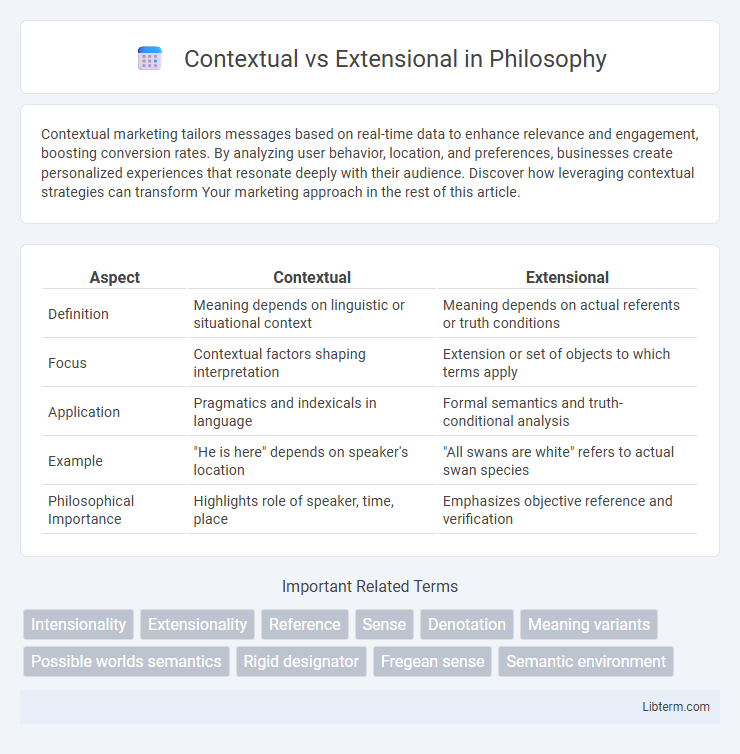Contextual marketing tailors messages based on real-time data to enhance relevance and engagement, boosting conversion rates. By analyzing user behavior, location, and preferences, businesses create personalized experiences that resonate deeply with their audience. Discover how leveraging contextual strategies can transform Your marketing approach in the rest of this article.
Table of Comparison
| Aspect | Contextual | Extensional |
|---|---|---|
| Definition | Meaning depends on linguistic or situational context | Meaning depends on actual referents or truth conditions |
| Focus | Contextual factors shaping interpretation | Extension or set of objects to which terms apply |
| Application | Pragmatics and indexicals in language | Formal semantics and truth-conditional analysis |
| Example | "He is here" depends on speaker's location | "All swans are white" refers to actual swan species |
| Philosophical Importance | Highlights role of speaker, time, place | Emphasizes objective reference and verification |
Understanding Contextual and Extensional Approaches
Contextual approaches emphasize the meaning of expressions based on the surrounding linguistic and situational context, allowing for dynamic interpretation in communication or language processing. Extensional approaches focus on the direct reference or denotation of expressions, relying on fixed entities or truth-values to define meaning objectively. Understanding the distinction between these methods is crucial in fields like semantics, logic, and artificial intelligence for accurately modeling language and knowledge representation.
Core Definitions: Contextual vs. Extensional
Contextual definitions specify the meaning of a term based on the context or situation in which it is used, emphasizing how language depends on circumstances for interpretation. Extensional definitions, in contrast, identify a term strictly by enumerating or describing all the objects or instances it refers to, focusing on the actual set of elements encompassed by the term. Understanding the distinction between contextual and extensional definitions is crucial for precise communication in linguistics, logic, and semantic analysis.
Historical Background and Theoretical Foundations
Contextual semantics originates from the work of traditional philosophers like Frege and later Wittgenstein, emphasizing meaning derived from linguistic and situational context. Extensional semantics, grounded in model-theoretic approaches from Tarski and Montague, focuses on truth conditions and reference to actual entities within a domain. Theoretical foundations contrast contextualism's reliance on pragmatic factors with extensionalism's use of formal structures and truth values to define meaning.
Key Differences Between Contextual and Extensional
Contextual refers to meanings or interpretations that depend on the surrounding context, emphasizing variables like situational factors, speaker intent, and language use. Extensional focuses on the actual entities or objects to which terms or statements apply, considering concrete examples rather than abstract meanings. Key differences include contextual semantics prioritizing variable interpretation influenced by context, while extensional semantics centers on fixed reference to tangible or definable sets of objects.
Practical Applications in Linguistics
Contextual and extensional analyses play crucial roles in practical linguistics by addressing meaning and reference in language use. Contextual semantics analyzes how speaker intention, discourse context, and pragmatic factors influence interpretation, essential for natural language processing and language teaching. Extensional semantics focuses on truth conditions and direct reference, supporting formal linguistics, computational models, and ontology development in knowledge representation.
Role in Philosophy and Logic
Contextual semantics interprets meaning based on the situational context and linguistic environment, emphasizing how expressions gain significance relative to speakers' intentions and circumstances. Extensional semantics relies on the mapping of terms to specific entities or truth values, focusing on the actual objects or states of affairs that statements denote or correspond to. In philosophy and logic, the distinction shapes debates on meaning, reference, and truth conditions, influencing approaches to language analysis and formal semantics.
Advantages of Contextual Analysis
Contextual analysis offers significant advantages by interpreting meanings based on the surrounding textual and situational environment, enhancing precision in language understanding. It allows for dynamic adaptation to nuances, idiomatic expressions, and evolving usage patterns, which extensional approaches relying on fixed definitions often miss. This adaptability improves semantic accuracy in natural language processing, information retrieval, and machine learning applications.
Strengths of Extensional Methods
Extensional methods excel in providing clear, objective classifications by directly referencing specific instances or examples within a dataset, enhancing accuracy in real-world applications. These methods simplify complex semantic relationships by focusing on observable entities, which improves scalability and facilitates efficient data processing in large-scale information systems. The reliance on empirical data rather than abstract definitions makes extensional approaches particularly robust in dynamic environments where context varies significantly.
Challenges and Limitations
Contextual and extensional approaches face significant challenges in accurately capturing meaning due to ambiguity and variability in language use. Contextual methods often struggle with the dynamic and nuanced nature of situational factors, leading to inconsistent interpretations. Extensional techniques encounter limitations in scalability and precision when mapping extensive real-world entities to formal representations.
Choosing the Right Approach: Contextual or Extensional
Choosing the right approach between contextual and extensional depends on the specific needs of data interpretation and knowledge representation. Contextual approaches emphasize understanding meaning through surrounding information and situational factors, making them ideal for user-centric and dynamic environments. Extensional methods focus on explicit, well-defined sets and relationships, providing clarity and consistency for formal logic and database querying tasks.
Contextual Infographic

 libterm.com
libterm.com